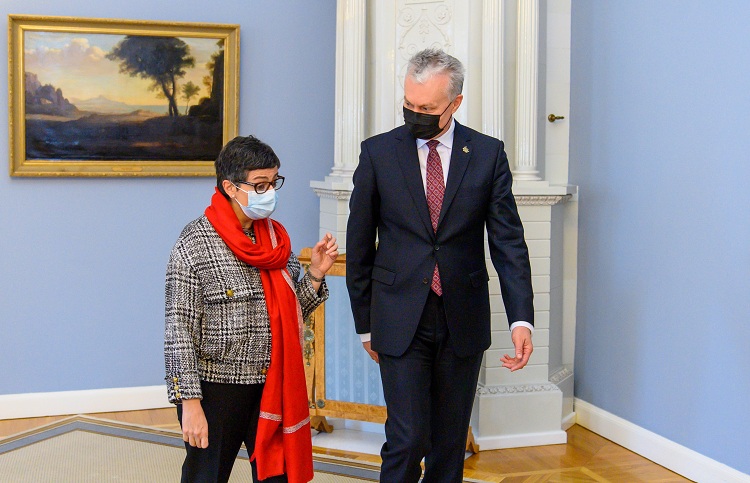Eduardo González
The Minister of Foreign Affairs, Arancha González Laya, completed yesterday in Lithuania the first stage of her tour of the Baltic countries, in the course of which she avoided pronouncing on Ukraine’s application to join NATO, which has outraged Moscow, and assured that Spain wants a relationship “of peace and stability” with Russia and Belarus but “will not tolerate aggressions against the EU”.
During the joint press conference with her Lithuanian counterpart, Gabrielus Landsbergis, Gonzalez Laya assured that one of the main objectives of his official trip to Vilnius is “obviously” the preparation of “the celebrations for the hundred years of diplomatic relations” between Spain and Lithuania. “We are friends, partners and allies and we want to invest in this alliance and partnership”, she said. The two countries will commemorate in 2022 the centenary of the establishment of diplomatic relations and the thirtieth anniversary of the restoration of these relations.
She also assured that “Spain is committed to the security and defense of the eastern flank of the EU”, which is reflected in the presence of “men and women” of the Spanish Armed Forces in NATO missions in the Baltic countries “as part of the efforts to ensure security on the eastern flank of the EU”. In this regard, the Lithuanian Foreign Minister thanked during the press conference “Spain’s contribution to security in the region”.
During her meeting with Landsbergis, according to Gonzalez Laya, the two foreign ministers discussed ways to “strengthen European unity” and the EU’s relations with the eastern and southern neighborhood. “We are not thinking of an adversarial relationship with our neighbors, we want peace and stability with the EU’s neighbors, with Russia and Belarus”, just as “we want peace and stability with countries like China”, but “we will not tolerate aggressions against the EU, and this is a very clear message that we must send at this time”, she said.
Regarding the decision of the President of Ukraine, Volodimir Zelenski, to officially request this past Tuesday that his country’s entry into NATO be expedited, a move that has provoked the indignation of Russia and the support of the President of the United States, Joe Biden, González Laya recalled that “Ukraine has a special relationship with NATO in short of being member and enjoys a fruitful and healthy special status” within the Alliance. “We do not want problems with our neighborhood, we want peace and stability in this region, and we will have an opportunity to discuss the specific relationship with Ukraine at the NATO summit next June”, she added.
In this respect, the Lithuanian minister was much more direct in his opinion and assured that his government plans to offer Ukraine an “action plan” for its accession to NATO and asked the allies to “reconsider this possibility” in order to send “a strong signal to Russia that the transatlantic orientation adopted by Ukraine has the appreciation and resonance of the Alliance countries”.
On the other hand, González Laya regretted that the situation in Belarus “is deteriorating” and warned that “it is not a geopolitical question, it is a question of respect for democracy and human rights”. “Just as we are concerned about democracy and human rights within the EU, we are concerned about democracy and human rights in our neighborhood, especially when the population in Belarus massively calls for democracy and human rights, and we will continue to support any measures to promote democracy and human rights in Belarus”, added the minister, who also met yesterday in Vilnius with Svetlana Tikhanovskaya, the opposition leader who came second in last summer’s presidential elections in Belarus.
Meetings with the president and the prime minister
After her meeting with Landsbergis, González Laya was received by the President of Lithuania, Gitanas Nauseda, who thanked Spain for its participation in NATO’s Enhanced Forward Presence (EFP) and in the air police mission in the Baltic States. The President and the Minister also discussed “the deterioration of the situation in Russia in terms of human rights and freedoms and Moscow’s increasingly aggressive attitude”, as evidenced by “the mobilization of troops on the border with Ukraine”, according to the Lithuanian President. For this reason, “Lithuania will seek additional sanctions from the EU if the situation does not change”, added Nauseda, quoted by the Presidency of the country.
In addition, González Laya met with the Prime Minister of Lithuania, Ingrida Simonyte, who also praised Spain’s contribution to the security of the Baltic States and NATO’s eastern flank and thanked the Spanish Government and the Spanish Consulate in Caracas for the help provided in the relocation of 26 people of Lithuanian origin from Venezuela, according to the Lithuanian Government. The Minister also laid a wreath at the Anatkalnys cemetery in homage to the fallen for the independence of Lithuania and was received by the Speaker of the Parliament, Viktorija Cmilyté-Nielsen.






